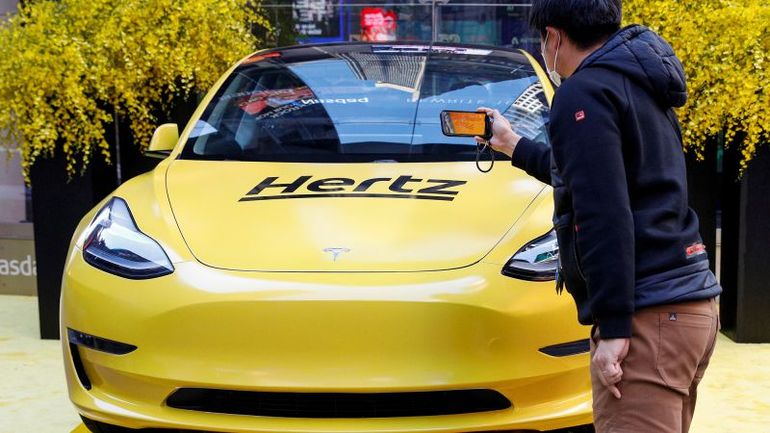
Hertz CEO Replacement Amid Electric Car Challenges

Hertz announces another CEO change amidst ongoing challenges with electric car initiatives, marking the fourth transition in the past four years.
Trouble and turmoil persist at rental car company Hertz. The company, which previously stated it would be selling 20,000 electric vehicles from its fleet, approximately one-third of its EVs, is now appointing a new CEO. This change marks the fifth CEO for the company in the span of four years.
The company has announced that Stephen Scherr, who joined two years ago from Goldman Sachs, will be stepping down at the end of this month. He will be succeeded by Gil West, who previously served as the chief operating officer of Delta Air Lines and General Motor's Cruise unit.
In the most recent quarter, Hertz experienced a $245 million decrease in earnings due to the decline in value of the electric vehicles it was selling.
American customers bought over 1 million EVs last year, a 40% increase from the previous year. However, traditional automakers were surprised by the lower demand for EVs as they entered the market. Tesla, the top seller of EVs in the US, initiated a price war over a year ago, which led to a decrease in the value of both new and used EVs, including those in Hertz’ fleet. As a result, Hertz experienced a decline in profits from reselling the vehicles.
The issue for Hertz was not necessarily the electric nature of the cars, but rather how the company managed its fleet overall, as stated by industry experts.
According to Daniel Ives, an analyst at Wedbush Securities, the way Hertz handled the execution and marketing of EVs was a complete disaster. It was a huge blow they couldn't recover from.
One of the issues Hertz faced was that even those interested in buying an EV may not necessarily want to rent one while traveling. It can be challenging to find a charging station or have enough time to charge the EV, unlike at home.
Hertz may have deterred customers from renting electric cars by strictly enforcing refueling rules without providing charging infrastructure at its rental locations. This approach may have harmed their business as customers may not want to go out of their way to find a charging station, especially early in the morning.
Hertz had initially planned to purchase 100,000 electric vehicles from Tesla in October 2021 to showcase its commitment to the growing demand for EVs and attract investors. This decision came right before the company's IPO after emerging from bankruptcy.
Following this, Hertz announced its intentions to acquire up to 175,000 EVs from General Motors and 65,000 EVs from Polestar, a company co-owned by Volvo and Geely. However, Hertz's total EV fleet only reached 60,000 before they decided to scale back. Despite this, the 60,000 EVs still made up 11% of their overall fleet.
Scherr informed investors during a 2023 call that Hertz faced challenges with collision and damage repairs on an EV, even without considering the depreciation of the vehicle.
In addition to the issues with EVs, Hertz encountered other problems as well.
Even if Hertz didn't face a $245 million loss from issues with its electric vehicles, it would still have faced losses in the fourth quarter and for the entire year. This is in stark contrast to rival Avis Budget Group, which saw profits with record revenue and the second-highest adjusted operating profit in its history.
The problems with the electric vehicles were not the only challenges for Hertz. In December 2022, the company agreed to settle 364 claims by paying $168 million. These claims were related to Hertz falsely reporting rental cars as stolen, leading to some customers being wrongly arrested or imprisoned. While Hertz mentioned that insurance would cover a significant portion of the settlement, this incident further tarnished its reputation.
Scherr did not make the decision to place a large bet on electric vehicle (EV) demand from rental car customers. This decision was made by his predecessor, Mark Fields, who was appointed interim CEO in October 2021, shortly before Hertz announced its intention to purchase 100,000 Teslas. This was the largest order ever placed with Tesla by a single buyer.
Following Fields as CEO, Paul Stone assumed the roles of president and chief operating officer at Hertz. He held these positions until he resigned in September. Stone took over just before Hertz filed for bankruptcy in May 2020. Despite the challenges faced by the rental car industry due to the pandemic and decreased travel and rental car demand, competitors Avis Budget and Enterprise managed to navigate the situation without filing for bankruptcy.
Where Hertz, which has been renting cars since the days of the Model T, was once the world’s largest rental car company, in 2023 its revenue was 22% less than its publicly held rival Avis Budget.
Editor's P/S:
The turmoil at Hertz is a cautionary tale about the challenges of managing a fleet of electric vehicles (EVs). The company's ambitious plan to sell 20,000 EVs backfired, leading to a $245 million loss in the most recent quarter. This loss, coupled with other issues such as false stolen car reports, has tarnished the company's reputation and led to the departure of its fifth CEO in four years.
Industry experts believe that Hertz's problems stem from its mismanagement of its EV fleet. The company failed to adequately address the challenges of charging and refueling EVs, and it enforced strict refueling rules without providing charging infrastructure at its rental locations. This approach deterred customers from renting electric cars, and it contributed to the decline in the value of Hertz's EV fleet. CEO signals a much-needed change in direction, but it remains to be seen whether Hertz can recover from its recent missteps and regain its former glory.









